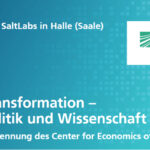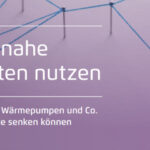
24.01. | Fraunhofer expert discussion on industrial transformation
24. January 2024
31.01. | Benefits of household-related flexibilities for the electricity system
31. January 2024Open letter to the Federal Government: Continue practice-oriented research into electromobility!

January 29th, 2024 | A broad alliance from research and industry is calling on the German government to provide federal funding for application-oriented research into electromobility in the 2024 budget and beyond. In an open letter, the signatories address the German government, which is planning to massively reduce funding for “measures for the further development of electromobility” in the Climate and Transformation Fund from the 2024 budget year and then phase it out.
Such a decision would be fatal for climate and industrial policy reasons, criticise the more than 25 universities, research institutions, companies and business networks, including the Reiner Lemoine Institute. The alliance is appealing to the German government to correct its budget plans. This is the only way to avert long-term damage to the transformation of the transport sector, the achievement of climate targets and the associated value creation of a key industry in Germany.
Securing knowledge for the sustainable transformation
The German automotive industry is in a decisive phase of transformation towards electric vehicles. The development of a robust domestic market for electromobility is essential in order to secure a sustainable position in international competition and achieve Germany’s climate protection targets. This also applies to the German government’s target of 15 million electric cars and a third of electric lorry mileage by 2030.
The importance of an efficient charging infrastructure, stable value chains and innovative industries such as battery production and recycling should not be underestimated. In this context, practice-oriented research, especially government-funded research projects in the field of electromobility, plays a decisive role. These projects provide independent knowledge that is essential for the implementation of the transformation in politics, administration and industry.
Value creation and resilience for critical raw materials
The electrification of lorries, the integration of charging points into the power grid and the changes in industrial value chains, particularly with regard to lithium-ion batteries and electric motors, represent key challenges. With the Critical Raw Materials Act, the EU has set ambitious targets for strategic raw materials, within the framework of which Germany must ensure a secure supply and effective recycling in order to maintain its competitive position.
The latest cuts to the research budget, according to the appeal, jeopardise Germany’s future industrial expertise and performance in a strategic, eminently important future field. The loss of knowledge that has been built up over many years and the associated restriction of the ability to act politically and economically will have serious consequences for Germany as a business location. It is therefore of the utmost importance that sufficient federal funding continues to be made available for electromobility research projects in the coming years in order to successfully drive forward the ecological and industrial policy transformation in the transport sector.
RLI Managing Director Christine Kühnel summarises the demands in the open letter from the RLI’s perspective: “The German government should correct its budget plans and continue to provide sufficient funding for research projects in the field of electromobility and for the energy transition as a whole. There can be no successful energy transition without research funding. Investment is needed now to develop the necessary innovations. We urgently need clarity on the status of the projects that have been planned for many months in some cases and in which we have invested a great deal of time and expertise.”
Further information
Here you can find the open letter “Continue practice-oriented research on electric mobility! Statement on the termination of electromobility research in Germany” with the participation of the RLI (only in German).
Co-signatory organisations of the open letter “Continue practice-oriented research on electric mobility!” are
- Accurec Recycling GmbH
- CONTARGO trimodal network
- Daimler Truck AG
- Deutsche GVZ-Gesellschaft mbH
- Entega AG
- Fachhochschule Erfurt
- Forschungsstelle für Energiewirtschaft e.V. (FfE)
- Fraunhofer-Institut für Arbeitswirtschaft und Organisation IAO
- Fraunhofer-Institut für Verkehrs- und Infrastruktursysteme IVI
- Friedrich-Alexander-Universität Erlangen-Nürnberg
- Hertie School Centre for Sustainability
- Hochschule Darmstadt
- Hochschule Pforzheim
- hySOLUTIONS GmbH
- ifeu – Institut für Energie- und Umweltforschung Heidelberg gGmbH
- IKEM – Institut für Klimaschutz, Energie und Mobilität e.V.
- Nuts One GmbH
- Öko-Institut e.V.
- Dr. Patrick Plötz
- Reiner Lemoine Institut gGmbH
- REWIMET e.V.
- RWTH Aachen University
- SWM – Stadtwerke München GmbH
- Technische Universität Berlin
- Volkswagen Group Innovation




